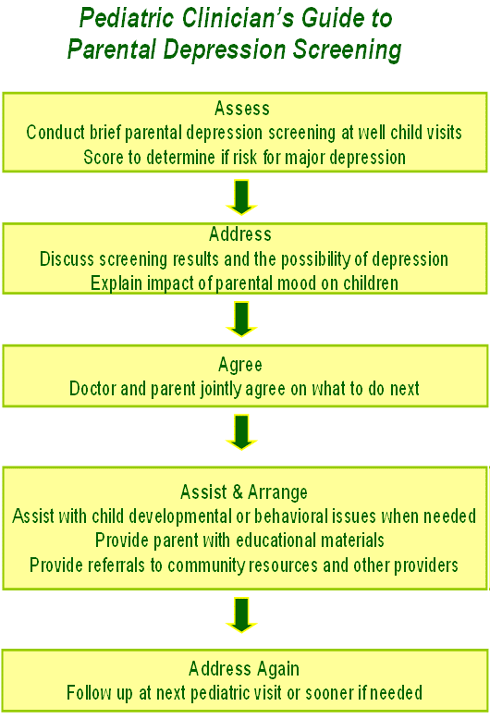Our project has defined five required steps for a clinician to screen parents of their pediatric patients for depressive symptoms and assist these parents (Figure 1). Parental depression screening identifies mothers or fathers with depressive symptoms who are at increased risk for major depression. It does not provide a diagnosis of depression. Subsequent administration of the nine-item questionnaire (PHQ-9) as a follow-up diagnostic measure can determine if DSM-IV criteria for major depression diagnosis are met. It also can be used to monitor severity of symptoms.
Figure 1. PDP Five A's

ASSESS:
We recommend using the PHQ-2 to systematically screen parents who accompany their child at all well visits. The two questions are scored by simply adding up the numbers for frequency of symptoms for each question for a total score of six. An adult who scores three or higher is considered at high risk for a depressive disorder. A copy of the PHQ-2 with an introduction to the parent is provided in the appendices.
ADDRESS:
The pediatric provider reviews the results and discusses positive scores (3 or greater) with the parent. If the parent has a low level of symptoms (1–2 score), the provider should only explore these issues further if a parent desires. If a parent with a low score is still concerned he or she may be depressed or has a borderline score, providers should discuss the possibility of depression, because lower levels of symptoms in parents can significantly affect parenting. This discussion may also provide an opportunity for parents to share social stressors in the family, current depression treatment, and other issues that may affect their parenting.
If the parent acknowledges he or she might be depressed or has a high level of depressive symptoms, the provider should offer information about how the parent's mood or mental health might impact the health and well-being of the child. The pediatric provider plays a key role in motivating parents to address depression. Many parents will get help if they understand it will help their child as well.
AGREE:
If the parent acknowledges depressive symptoms or that depression is a concern, then the provider should discuss options for further assessment and/or treatment. Coming to a joint decision that depression might be an issue is a good starting point for getting parents to take appropriate action.
ASSIST and AGREE:
The pediatric provider can refer the parent to his or her primary care provider, a mental health clinician, or other community resources for further evaluation and assistance. Providers can offer parents educational materials about the impact of parental depression on children's health. Information about handling stress is particularly helpful because one-third of parents who screen positive say they have problems with stress.
The provider should also explore whether the parent has any concerns about how their child is doing. The provider can offer assistance with the child's developmental, behavioral, or emotional problems. The provider can also provide information about parenting approaches that will help children thrive even if the parent is having difficulties.
Be sure to note parental stresses and mental health screen results in the patient's chart, so it can be followed up at later visits.
ADDRESS AGAIN:
Schedule a follow-up visit with the child if the level of parental dysfunction is likely to have a major impact on their child's development or behavioral/emotional status. If it's unlikely to have a major impact, plan to follow up at the next pediatric visit.
|
Practioner Comment: "I found that mothers with depression symptoms were really concerned about how to not have depression affect their child. I was able to give mothers specific ways to help their parenting while they were getting help. At the next visit I would see how treatment was going as well as how the child was coping." Dr. Viking Hedberg
Plymouth Pediatrics
|


